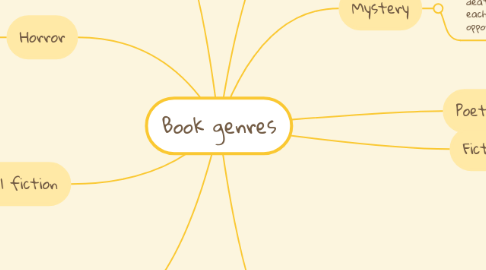Book genres
by Молоченко Єлизавета

1. Historical fiction
1.1. Historical fiction is a literary genre in which the plot takes place in a setting located in the past. ... Some subgenres such as alternate history and historical fantasy insert speculative or ahistorical elements into a novel.
2. Horror
2.1. Horror is a genre of speculative fiction which is intended to frighten, scare, or disgust. Literary historian J. A. Cuddon defined the horror story as "a piece of fiction in prose of variable length... which shocks, or even frightens the reader, or perhaps induces a feeling of repulsion or loathing". It creates an eerie and frightening atmosphere.
3. Adventure
3.1. Adventure fiction is a type of fiction in which an adventure forms the main storyline. The adventure is usually an exciting undertaking involving risk and physical danger.
4. Detective
4.1. Detective fiction is a subgenre of crime fiction and mystery fiction in which an investigator or a detective—either professional, amateur or retired—investigates a crime, often murder.
5. Mystery
5.1. Mystery fiction is a genre of fiction that usually involves a mysterious death or a crime to be solved. Often within a closed circle of suspects, each suspect is usually provided with a credible motive and a reasonable opportunity for committing the crime.
6. Fantasy
6.1. Fantasy literature is literature set in an imaginary universe, often but not always without any locations, events, or people from the real world. Magic, the supernatural and magical creatures are common in many of these imaginary worlds. Fantasy literature may be directed at both children and adults.
7. Fiction
7.1. Genre fiction, also known as popular fiction, is a term used in the book-trade for fictional works written with the intent of fitting into a specific literary genre, in order to appeal to readers and fans already familiar with that genre.
8. Fairy tale
8.1. A fairy tale is an instance of a folklore genre that takes the form of a short story. Such stories typically feature entities such as dwarfs, dragons, elves, fairies, giants, gnomes, goblins, griffins, mermaids, talking animals, trolls, unicorns, or witches, and usually magic or enchantments. In most cultures, there is no clear line separating myth from folk or fairy tale; all these together form the literature of preliterate societies.[1] Fairy tales may be distinguished from other folk narratives such as legends (which generally involve belief in the veracity of the events described)[2] and explicit moral tales, including beast fables.
9. Poetry
9.1. Poetry (derived from the Greek poiesis, "making") is a form of literature that uses aesthetic and often rhythmic[1][2][3] qualities of language—such as phonaesthetics, sound symbolism, and metre—to evoke meanings in addition to, or in place of, the prosaic ostensible meaning.


